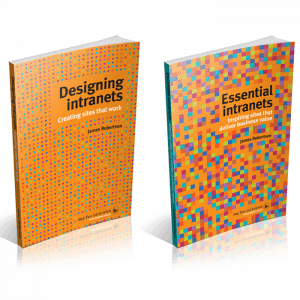
Hands sewing from Shutterstock
Filed under: Articles, Content management, Intranets
The goal of many intranets is to deliver high quality, up-to-date, accurate and useful information to staff. In practice, however, this can be challenging to achieve.
Much is expected of intranet authors, and they are vital to delivering an intranet that is useful (and used). Yet, in many cases, intranet authoring is treated as a hobby within organisations.
This briefing looks at the role of intranet authors, and challenges organisations to either take intranet authoring seriously, or to let go of unrealistic expectations regarding content quality and timeliness.
Is intranet authoring a hobby?
There are a number of clear signs that intranet authoring is treated as a hobby by organisations:
- intranet authors are not selected based on a required skill set, instead they are volunteered by their managers
- intranet authoring is often done by junior staff within a business area, such as administrative staff
- staff are not provided with extra time to author intranet content, but are expected to do it on top of their existing responsibilities
- intranet authoring doesn’t appear in formal job roles
- new intranet authors are provided little (if any) training
- ongoing support for intranet authors is minimal or non-existent
Expectations versus reality
A lot is expected of intranet authors. Standards are set, and style guides written, and intranet authors are required to closely follow these.
Management expects intranet content to be of a universally high standard, completely accurate and up-to-date.
Yet this is not reflected in the support provided to intranet authors. If intranet authoring is not part of their formal job role, and they are not provided with adequate time to write good content, is it reasonable to expect authors to write like professionals?
Something has to give. It is not practical or sensible to expect professional writing to be done by staff who are forced to treat intranet authoring as a hobby.
Relaxing standards
Perhaps the starting point is to relax some of the intranet authoring standards. As discussed in the earlier article Not all content needs to be of equal quality, it is not necessary to enforce the same level of quality across all intranet content.
This makes it easier for decentralised authors to publish content within the constraints of their time and skill levels.
Supporting authors
Beyond this, there are a range of steps that should be considered:
- including intranet authoring in formal job roles (as set by HR), and managing this like any other job responsibility
- explicitly allocating time to authoring
- providing rewards or recognition for authors
- providing comprehensive training for new intranet authors
- offering ongoing support and assistance to authors
- establishing useful (and usable) templates, samples and style guides
- ensuring the intranet team has a greater say in who is chosen as an intranet author
- establishing required skill sets for intranet authors
Professional writers
At the end of the day, staff are generally not employed for their writing skills. If the corporate policies and procedures needs to be written well and be completely accurate, perhaps this should be done by professional writers?
There is much to be said for establishing a central team of professional writers, giving them the responsibility for maintaining key corporate information resources. This team can then complement the work of the decentralised authors.





